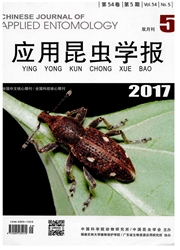

 中文摘要:
中文摘要:
【目的】了解北京和河北地区小菜蛾Plutella xylostella(L.)对主要防治药剂的抗药性现状,为小菜蛾的有效防治提供参考。【方法】2011—2015年,采用浸叶法监测了小菜蛾对9种药剂的抗药性。【结果】小菜蛾对氯虫苯甲酰胺、多杀菌素和丁醚脲均为敏感水平,对Bt制剂、虫螨腈和茚虫威个别年份出现中等抗性水平,但总体上为敏感状态,对阿维菌素和氟啶脲保持中等抗性水平,对高效氯氰菊酯为中等至高水平抗性。【结论】在北京和河北地区高效氯氰菊酯不适用于小菜蛾的防治,少用或暂停使用阿维菌素,其它药剂可交替或轮换使用。
 英文摘要:
英文摘要:
[Objectives] To clarify the level of insecticide resistance in the diamondback moth(DBM) in Beijing and Hebei and thereby provide information to improve control of this pest. [Methods] The resistance of the DBM to nine insecticides was evaluated from 2011 to 2015 using the leaf-dipping method. [Results] Populations of DBM collected from Beijing and Zhangjiakou, Hebei Province, were susceptible to chlorantraniliprole, spinosad, and diafenthiuron. Resistance to Bacillus thuringiensis(Bt), chlorfenapyr and indoxacarb was moderate in some years, but populations were generally susceptible to these pesticides. Resistance to abamectin and chlorfluazuron was consistently moderate, and high resistance to beta-cypermethrin was found. [Conclusion] Beta-cypermethrin is not suitable for controlling DBM in Beijing and Hebei. The use of abamectin should be discontinued, either permanently or temporarily, to prevent the development of resistance to this pesticide. Other insecticides should be used in rotation, or in alternative ways.
 同期刊论文项目
同期刊论文项目
 同项目期刊论文
同项目期刊论文
 期刊信息
期刊信息
